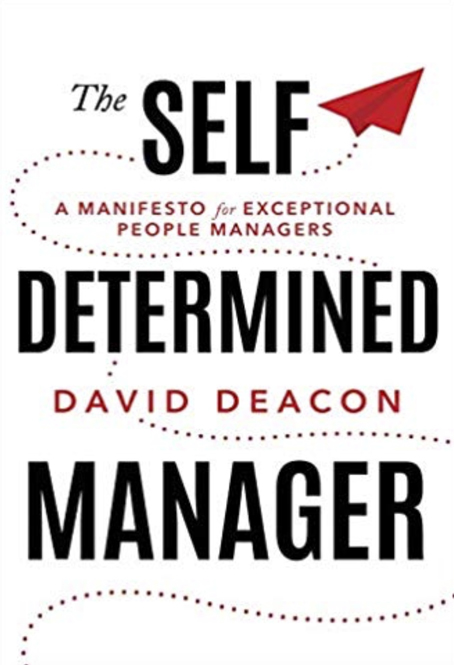Author of The Self Determined Manager and seasoned HR professional, David Deacon, explores how great managers create workplace belonging and inclusion. In the second of three columns, exclusively for Fair Play Talks, he discusses the importance of ‘finding greatness in each team member’.
FINDING ‘GREATNESS’ IN EACH TEAM MEMBER
In my last article, about managers and inclusion, I introduced the idea that the best managers – the ones I call self determined managers – are conscious and deliberate creators of amazing team environments, creating microclimates where individuals thrive and the team collectively does great work with great spirit. These rare managers help us to do our best work, usually better than we realise we are capable of, and foster team dynamics that feel amazing to be part of. They know their own minds, make their own decisions, and are driven, ambitious, positive and respectful.
One of the things they do really well, and consistently, is they make sure that everyone on the team gets heard, and that was the topic of the last article. This is necessary for an inclusive environment, indeed necessary for any team environment where individuals and the team can thrive. A self determined manager knows this, and focuses on it because it matters to them. That’s the way they choose to manage and it creates the kind of team they want to lead.

But there’s more. A great manager is skilled at focusing on the capabilities and contributions of the individuals on the team as well as the workings and dynamics of the team overall. They focus on the ‘greatness’ in individual team members. They do this in a number of distinct ways, and these all matter in creating an environment where individuals can succeed, grow and be their best selves.
FINDING GREATNESS
Here’s how self determined managers find greatness in their team members:
- They get very clear on what each person on their team is good at. They do this on their own terms, using their own observations, watching their people, and thinking carefully about how and when they succeed. This is really not about corporate skills models and job descriptions, but them using their own words and their own thinking. Remember the manager who worked out you were good at something you didn’t think you had in you; or pushed you to try something that you then did really well at; or talked openly with you about how good you were at something? They were acting like a self determined manager. The managers who relied on competency frameworks and performance management processes were being lazy and inattentive. However, the manager who really cared, observed, articulated and appreciated the things you did well.
- They get really clear on each person’s weaknesses, and especially the ones that actually matter to their success and professional growth. Just as with strengths and skills, they do this in their own way, observing and thinking, using their own words. They are not swayed by reputation, or others’ points of view, or pre-conceptions and prejudices. They watch, decide and then discuss. Crucially, they focus on the weaknesses that actually matter. Things that have little or no bearing on the individual’s professional effectiveness and growth are not given airtime.
- They make sure they have a sense of what drives each team member, and the scope of their ambition because they are genuinely interested in their future. This is not achieved in a single conversation. It’s not the outcome of a ‘career development discussion’ or ‘mid year review’. It’s an understanding, reached over time and through multiple conversations about where their hopes lie, and what propels them. It’s based on what the individual says and does, not rooted in assumption or guesswork. It’s sought simply because they want to be able to help the individual do their best work and grow in the ways they aspire to. There is no power-play or attempt to be wise or omniscient; this is all about making the individual brilliant.
- They are strong and steadfast supporters, and ‘on the side of’ each of their employees. They have their staff’s best interests at heart. You know if you have worked for a manager like this. It builds your self-confidence. It gives you a platform. You feel positive about your work and good about yourself. It’s a piece of the magic of working for a self determined manager. It’s a key mechanism in their being able to help you to do better work than you realised you could.
- They have a plan for each team member – not a ‘personal development plan’ but a plan for what they could do, should do and might do. It’s a plan for what will help them succeed now and grow in the future, including points on what will make them great, where they could be headed and what they could achieve. Once again this is in their own words and their own terms, and based on what they see and what they know about the person. It might also be reflected in some formal development plans, but it’s not a result of those processes. The plan is in their heads and in their hearts, and it’s about how great each person who works for them could become. Let me repeat that. It’s about how great each person who works for them could become. This is the attitude of a fantastic manager. Regardless of the starting point, the capabilities and skills, ambitions and motives of the individuals on the team, they want to make each of them great. As great as they can be; as great as they can help them to be. There’s no bias in this, no favouritism, no picking and choosing. They want everyone who works for them to be better as a result of working for them. This is about the legacy they leave for the people who worked for them, and they have this ambition for everyone who works for them. No exclusions.

GREAT EXPECTATIONS
To be sure, self determined managers hold people to account for high standards of attitude and outcomes. Their steadfast and transparent support comes with expectations. Someone who does not bring their mind and their heart, who is inattentive or non-committal or is a source for bad things, gets confronted with that in a direct and open conversation with their manager, which makes clear what is missing and what is needed.
Of course, in the end, this might lead to them needing to find another team where they are a better fit. But it’s comparatively unusual that this is needed. A great manager relies mainly on their enthusiasm, their enabling, positive approach to the work and the great team dynamic that they foster to ensure that employees want to do well, want to create and share successes, want to have an impact, and want to succeed and grow.
If you have worked for a manager like this, you will have come away changed in some way, and usually in a good way. Everyone benefits from a manager like this, because it’s personal. It’s inclusive, respectful, positive, honest and personal. We all want to work for great managers like this.
In Part 3 of How great managers create belonging & inclusion (to be published next week), David Deacon will explore the importance of building fantastic teams.
Click here to read Part 1 of How great managers create belonging & inclusion.
AUTHOR BIOGRAPHY
David Deacon’s HR expertise spans more than 30 years. He has worked for a variety of the world’s leading companies, including MasterCard and Credit Suisse, and has lived and worked in the US, the UK and Asia. A thought-leader in the fields of learning and development, talent management and leadership development, he has influenced leaders and teams around the world, and created better-managed companies as a result. He continues to drive impact through leading world-class talent management approaches in the companies where he works. In 2014, Deacon was recognised by the Best Practice Institute as a Best Organisational Practitioner. His first book, The Self Determined Manager, was published in 2019; the Self Determined Training Company helping to create better managers was established in same year. Click here for more information.







































